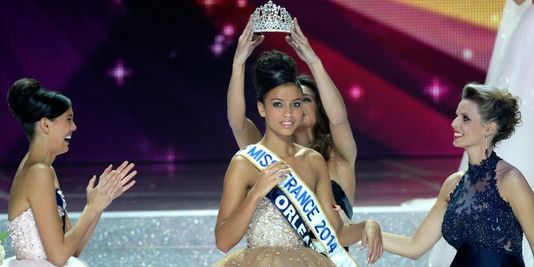
Miss France 2014 being crowned
We think that through our multicultural mind-set, other cultures will follow our (pious) example.
Well, people don't want to change.
The new Miss France is a metisse: the offspring of a black mother and a white father.
I've tried to find a current definition (and translation) of "metissage" but have decided to keep the word in its French. Tiberge from Gallia Watch has come to the same conclusion, and explains her decision here. She writes:
Here is my rendition of his words. It is far from perfect, because his grammar seems a bit off at times. Except for two places, I have retained the French word "métissage" (crossbreeding), and it's various verbal and adjectival forms, since "crossbreeding", "racial mixing" and other similar terms don't always convey the right meaning. "Crossbreeding" sounds too scientific, as when farmers crossbreed crops. "Miscegenation" is too technical and refers to marriage. "Mongrelization" and "bastardization" are too graphic. It looks as if "métissage" will join "laïcité" and "communautarisme" as French words that are so troublesome, it's better to just leave them.This Metisse Miss France says:
"I think that my metissage is a strength."
Which is a variation on "Diversity Our Strength."
She says about her "metissage":
Je pense que mon métissage est une force. Ca montre que la France d’aujourd’hui est une France mélangée où il y a toutes les cultures. Et je pense que beaucoup de personnes peuvent se retrouver en moi, que ce soit les Français de souche ou les Français d’origines diverses.--------------------------------------
I think my miscegenation is a strength. It shows that today's France is a mixed France, which has all cultures. And I think that many people can identify themselves in me, whether they are "les Français de souche" or those french from diverse origins .Some notes on the translation:
- "find themselves in me" implies a deep, even ancestral identification rather than through skin color or looks.
- "Les Français de souche" is a difficult phrase to translate, and Tiberge has given a brief definition here, where she writes: "[I]n French the word "souche" means "root", a "Français de souche" being, therefore, an ethnic Frenchman."
- Rather than say "French of diverse cultures" Miss France goes one step back and says French of diverse origins, as though these are not French people - i.e. les Français de souche - but other peoples of the world. But more specifically, she means French of diverse origins who come from non-European countries.
Miss France is pretty. I thought she was Arab when I first saw her photo, and that her "metissage" was white and Arab. But, here are her parents:
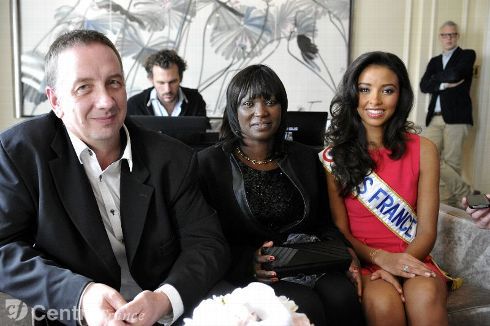
Miss France's parents
Her father is from Orleans, the heartland of France, in the beautiful Loire Valley, in whose town center stands a statue of Joan of Arc.
Her mother is from the west African country Benin.
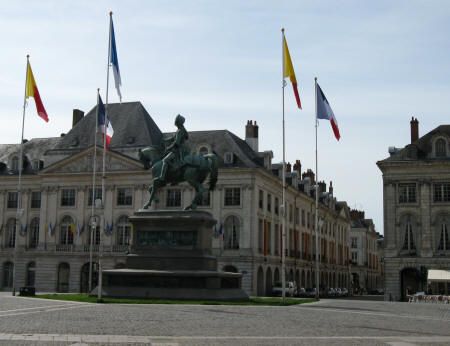
Statue of Joan of Arc in the city square of Orleans
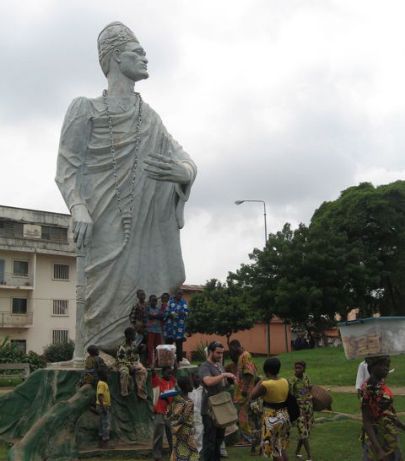
Statue of King Toffa in Porto Novo, Benin
She looks nothing like either of them. How does she identify with her parents? Children often resemble at least one of their parents, and if they have siblings, the resemblances would be distributed amongst the two parents. They can say "I come from that family," which of course leads to the bigger identification of "I come from that culture," and eventually "I come from that country."
Although Miss France's mother speaks fluent French, she has a slight accent. French is the official language of Benin, which also has a plethora of indigenous languages. Most African countries which were colonized by the British or the French use these European languages as their official ones, but also speak one or more other native language.
I wonder how Flora reacted to her mother's accent growing up? Young children are very discerning of differences. This must have accentuated her mother's "otherness" to her even more. Her father, like her, speaks French like a Frenchman.
Miss France has to invent an identity for her amorphous and difficult-to-identify mixed-parentage of such different racial and national backgrounds. Even countries where metissage is common in the core identity of the country, like Brazil, for example, the strong and confident groups are not the metisse, but those who claim a particular racial group, like blacks or whites. In Canada, there is a racial group called Metisse, but they have never forged alliances either with the "Natives Canadians," i.e. those with Indian ancestry, or with whites. Their cultural and political, and even personal, strength is minimal.
I don't know how strong metissage will prove in France. I don't think it is a strength, as Flora says above. Whites may be having a hard time identifying their whiteness with strength, but there is a group which is not at all shy of doing so, and it is growing in strength and in numbers: Muslims. And this group doesn't tolerate any kind of metissage, either in racial or religious terms. It jealously guards its religious, and cultural, identity. And it eventually seeks to put everyone within its own religious identity, possibly with hierarchical categorizations of Arab Muslims at the top and with white and black Muslims at the bottom of the ladder. The religious superiority of Islam is mandated through their religious book, the Koran. Muslims show this repeatedly throughout history in whatever country they have amassed numbers any strength. Why should France be any different? Where would the black and white metisse like Flora fall under this categorization?
Here is Flora's more specific association with her African roots:
"Je suis franco-béninoise. Je mets en avant mes deux origines. Mes parents ont une association au Bénin, qui vient en aide aux enfants et s'occupe du forage. Au cours de mon année, je souhaite soutenir l'insertion des femmes dans le travail et l'alphabétisation", a-t-elle expliqué après son sacre.Below is my translation:
I am Franco-Beninese. I give equal importance to both my backgrounds. My parents have an association in Benin, which helps children and drills wells. During my reign, I hope to provide work and literacy for women [in the Benin project, I presume].In the Wikipedia definition of Beninese (the English translation for Béninois) such a person is:
From Benin, or of Beninese descent.Flora thus identifies with the culture (or racio-culture) as well as the nationality of Benin.
Her metissage does not place her white and black backgrounds on an equal level: she is more black than white. Her diversity does not put all cultures on an equal footing: she is more Béninoise than Française.
Whenever a mixed-race child with one parent who is white and the other Asian, African or Hispanic, is asked to chose his identity, he will always identify with the non-white parent. This seems to be the rule of racial identity.
This of course also leads to identification with the non-white parent's cultural and national background, even as this mixed-race child lives, and benefits from, the culture, civilization and accomplishments of whites.
I will try to refine this and coin a definition (or definitions) in the manner of: First Law of non-whites' racial and cultural identification.
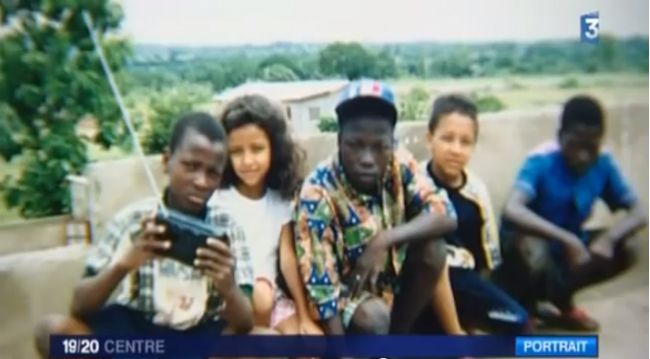
Flora in Benin as a small girl, visiting her cousins, as Mr. Coquerel informs us in this video.
Her parents kept her in direct contact with her mother's country from an early age.
-------------------------------------------------------------------------------------------------------------------------------------------------------------
Posted By: Kidist P. Asrat
-------------------------------------------------------------------------------------------------------------------------------------------------------------
